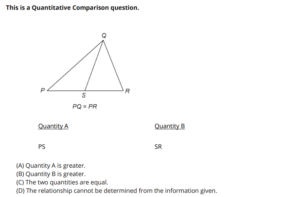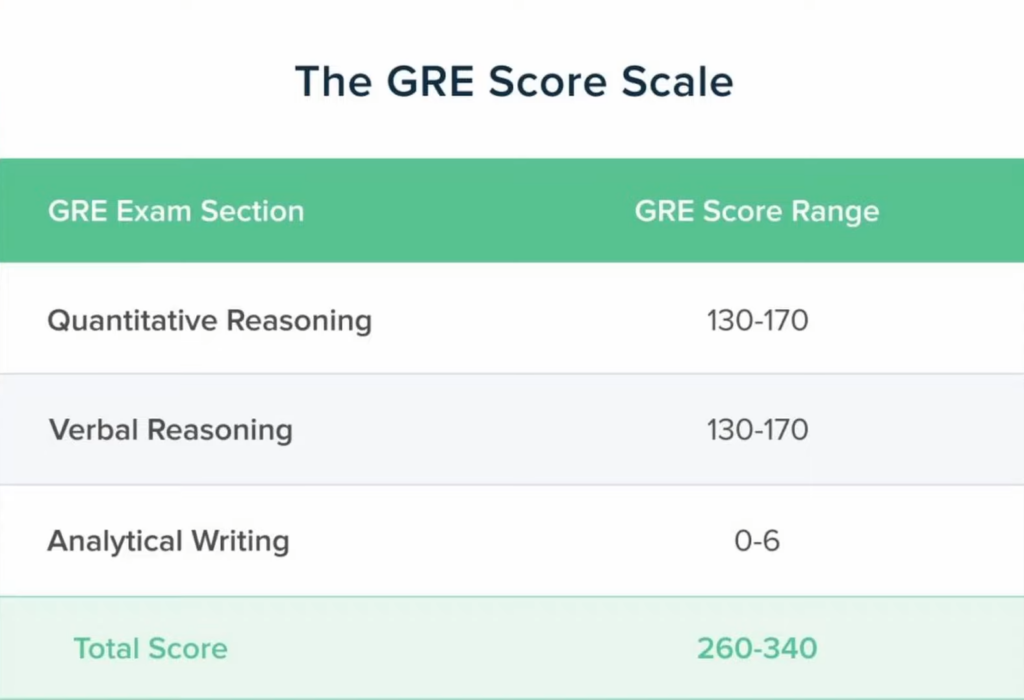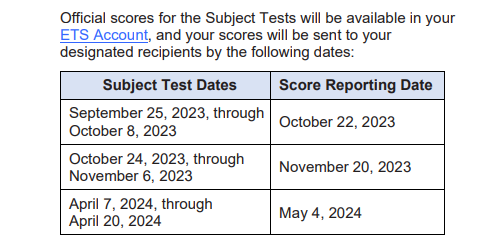Many Indian students dream of pursuing a Master’s degree abroad. But to get into top programs, you’ll need to clear the GRE exam. That is why around 100,000 Indians take the GRE every year.
This test assesses your skills in several areas, and understanding the GRE exam syllabus is your key to effective preparation.
This guide will break down the GRE syllabus for MS programs in 2024, covering the different sections and what’s tested in each exam. Whether you’re targeting a GRE maths syllabus heavy on quantitative reasoning or a GRE verbal syllabus focused on strong vocabulary, this guide will prepare you for what to expect.
Table of Contents
What is the GRE exam?
GRE exams syllabus in 2024 (Section wise)
How to prepare for the GRE exam?
FAQs
What is the GRE exam?
Let us begin by answering the question: ‘what is the GRE exam?’. It’s a test that many students take before they go to graduate school. GRE stands for Graduate Record Examination, and is a standardized test. It is accepted by graduate schools around the world, and helps assess your readiness for the rigors of postgraduate studies.
While the specific requirements may vary by program, a strong GRE score can boost your application. Understanding the GRE exam syllabus ensures you focus your preparation on the right areas. Many universities consider the GRE general test syllabus, which applies to most programs. There are also GRE Subject Tests in specific fields, but we’ll mostly focus on the general test in this guide.
It is a computer-based exam with a total score of 340 that takes about 2 hours to complete. Doing well on the GRE opens doors to many graduate programs. Knowing the GRE exam syllabus well is the first step in your preparation.
A huge change that was brought in in 2023 was the removal of 46 questions from the total tally. As of now, here is what your GRE exam will look like.
| # | Section | Structure | Est. Timing | |
| 1 | Quantitative Reasoning | 2 parts, 27 total questions | 30 minutes | |
| 2 | Verbal Reasoning | 2 parts, 27 total questions | 48 Minutes | |
| 3 | Analytical Writing | 1 part, 1 essay question | 42 Minutes | |
| Total Time | 2 Hours (120 Minutes) | |||
GRE Exams Syllabus in 2024 (Section wise)
Conquering the GRE requires a solid understanding of the test format and what skills it assesses. The GRE general test has three main sections: quantitative and verbal reasoning, and analytical writing. Let’s break down each section’s key aspects to help you prepare effectively.
-
Quantitative Reasoning
The Quantitative Reasoning (Quant) section is all about your math skills. Don’t worry, it’s not about fancy calculus or advanced formulas. This section focuses on the core mathematical abilities you learned in high school. Here’s a closer look at what’s tested.
-
Arithmetic
This includes integers, exponents, roots, estimation, percentages, and number sequences. High-school level arithmetic concepts are drawn upon throughout the section, not only this part.
-
Algebra
Prepare for working with exponents, factoring expressions, and solving equations. You’ll tackle linear and quadratic inequalities, plus word problem equations. You’ll also encounter concepts related to coordinate geometry, like graphs, slopes, and intercepts. Below is a sample algebra question from ETS’s website.
-
Geometry
Expect to be tested on your knowledge of lines, circles, triangles (including special types), quadrilaterals, and other polygons. You will also be tested on concepts including area, perimeter, volume, and the Pythagorean theorem. Yet, proofs of questions will not be asked for “PROVE that this is a right triangle, etc.). Below is a sample question from ETS.
-
Data Analysis
This part explains mean, median, mode, range, and data interpretation. It includes tables, bar graphs, line graphs, scatterplots, and frequency distributions. You might also encounter some elementary probability concepts. Here is a sample data analysis question from a past GRE exam.
It’s important to note that the GRE focuses on high school-level maths, not exceeding second-year algebra. There’s no trigonometry, calculus, or other advanced topics. Learn more: GRE General Test Quantitative Reasoning Overview.
ETS offers a PDF of sample questions based on the GRE mathematics syllabus.
-
Verbal Reasoning
This section assesses your reading comprehension, vocabulary skills, and critical thinking abilities. Here’s what to expect.
-
Reading Comprehension
In this section, you’ll analyze passages from different sources. Answer questions to test your comprehension of main ideas and supporting evidence. The aim is to understand the author’s perspective and draw conclusions based on your understanding of the text.
-
Text Completion
Here, you’ll need to select the word or phrase that best completes the meaning and flow of incomplete sentences. This assesses your vocabulary and understanding of how words function within a sentence.
-
Sentence Equivalence
This question type presents you with a sentence. It asks you to choose another sentence with the same meaning. It tests your grasp of synonyms, paraphrasing, and understanding of sentence structure. Here is an example of a related question from a past exam.
ETS offers a PDF of sample questions based on the GRE verbal syllabus.
-
Analytical Writing
The Analytical Writing section assesses your critical thinking and analytical writing skills. While there is no ‘syllabus’ for this section, we can explain the question to you.
The task in this section is called the ‘analyze an issue’ task. It is for tests after September 22nd, 2023.
You’ll be given an opinion on an issue and instructions on how to respond. Check the issue, think about its complexities, then build your argument with supporting evidence. Unlike the essays you got in high school, here you will be given the viewpoint or ‘stance’ that you are to take. You cannot give your own interpretation of the topic.
ETS has published a ‘topic pool’ based on the GRE exam syllabus from which your essay topic will be selected.
Those were the three sections of the GRE exam syllabus for MS programs. Next, three important things to keep in mind while preparing for the exam.
Notes
- The GRE provides a basic on-screen calculator for the Quantitative Reasoning section.
- While the calculator can be helpful for some computations, focus on mastering mental maths to save time. Reason: the calculator is point-and-click based, so you’d waste a fair amount of time getting to your answer. Only use it when you really need to.
- Analytical Writing tasks are graded using a holistic scoring system, so clear and well-organised writing is essential.
Remember, consistent practice is key to GRE success. Practice taking timed tests to mimic real exams and pinpoint weak areas. Understanding the GRE exam syllabus sections and using prep strategies helps you reach your target score.
While the GRE exam changed significantly in 2023, there has been no notable change to the scoring system. That remains as it has been, marked out of 360, as shown below.
How to Prepare for the GRE Exam?
At first glance, the GRE exam syllabus can seem quite daunting. Here are a few tips to help you master the GRE exam pattern and syllabus.
-
Quantitative reasoning
- Revisit high-school maths topics like algebra, geometry and data Analysis. You can study with textbooks or Khan Academy videos.
- Identify your weaknesses through practice tests and focus your studies on those specific areas. Khan Academy offers categorised practice problems. Practice often to achieve a solid understanding; memorization alone is not enough.
- Use the free PowerPrep™ practice tests from the Educational Testing Service (ETS), the GRE test maker.
- Take full-length practice tests under timed conditions at least once a week. Analyse your mistakes to identify knowledge gaps and why you got them wrong. Retest on mastered topics to solidify your understanding.
- Download a free mental maths app to improve your calculation speed and estimation skills. Start with basic operations (addition, subtraction, multiplication, division). Then, increase difficulty to fractions, percentages, and decimals. Practice often for improved speed and accuracy.
- Before using the calculator (remember, it’s optional!), try to estimate the answer. This hones your problem-solving skills and helps identify unreasonable answer choices.
- Interpret data from different formats: tables, graphs (bar, line, scatterplots), pie charts.. Focus on identifying trends, central tendencies (mean, median, mode), and outliers.
-
Verbal reasoning
- Use flashcards (physical or digital) to learn common GRE words.. Aim for 5-10 new words daily.
- Practice reading challenging articles from credible sources like The New Yorker, WSJ, and HBR. Here’s the process.
- Set a timer to simulate test conditions.
- Read the article , highlighting key points and supporting evidence.
- After reading, write a concise summary focusing on the main idea, arguments, and opposing viewpoints (if presented).
- Review your summary and the original article, identifying areas for improvement.
- Repeat frequently till you get the hang of it.
- Practice exercises like Khan Academy’s ‘Practice Sentence Completion’. These develop your skills in identifying the missing word based on context and answer choices.
Analyze why each answer choice works or doesn’t work based on grammar and meaning. Complete 10-15 practice problems daily, increasing difficulty as you go.
- During your reading, don’t skip unfamiliar words! Instead, use surrounding sentences (context clues) to infer the meaning. Write down the word, your inferred meaning, and look up the actual definition later. This reinforces vocabulary building and context clue mastery.
- Many GRE words share common root words. Learn common prefixes, suffixes, and root words to decode unfamiliar vocabulary. This equips you to tackle even new words you haven’t encountered before.
-
Analytical writing
- Select an opinion piece from a reputable news source. Analyze the argument presented, considering its strengths, weaknesses, and any underlying assumptions. To start, outline the essay on the issue in detail. Include various viewpoints and counter-arguments.
- Use free practice prompts from ETS or The Princeton Review that involve analyzing arguments. Here’s your strategy.
- For this timed practice essay, break down the argument’s structure. Uncover author’s assumptions and biases.
- Check the logical soundness of the argument, highlighting any fallacies or weaknesses.
- Find a writing partner or online forum dedicated to the GRE. Share your practice essays and seek feedback on clarity and structure. Get constructive criticism to improve persuasiveness and address the prompt.
- Revise your essay based on the feedback received, and consider asking for feedback on later revisions. This process helps you improve writing skills and make strong arguments.
Remember, consistent effort and focused practice are key to GRE success. Implementing these steps and using free resources will help you reach your desired score. And with that, we come to the end of this article on the GRE exam syllabus. We hope you found it useful, and we’ll see you in the next one.
FAQs
-
Is there a separate GRE syllabus for physics, engineering, or computer science?
No, the GRE General Test uses the same syllabus for all test-takers, regardless of their intended field of study. The focus is on assessing general foundational skills rather than subject-specific knowledge. Thus, the GRE physics syllabus, the GRE engineering syllabus, and the GRE CS syllabus are all the same.
-
What is the GRE exam syllabus for electrical engineering?
The GRE exam syllabus for electrical engineering is the same as any GRE engineering syllabus. Being a standardized test, there is no special gre exam syllabus for electrical engineering. However, if you like, you can take specialized GRE subject tests. The Physics Subject Test might be relevant for some electrical engineering programs. Check with your desired program to see if a Subject Test score is required.
-
Does the GRE test grammar rules explicitly?
The GRE exam syllabus doesn’t mention a dedicated grammar test. However, strong grammar and mechanics are crucial for the Analytical Writing section. Clear and concise writing ensures your arguments are well-communicated and impactful. Consider using a grammar refresher or style guide to brush up on essential grammar rules.
-
What’s the difference between the GRE General Test and Subject Tests?
The GRE General Test is a broad assessment of your verbal, quantitative, and analytical writing skills. It’s widely accepted by most graduate programs. Subject Tests, on the other hand, delve deeper into specific fields like Physics, Math, or Chemistry. They are needed for programs where the GRE quant syllabus doesn’t cover the scope of the program. Some programs might require a Subject Test score in addition to the General Test. Always check with your desired program to see if a Subject Test is mandatory.
-
Is there negative marking on the GRE?
No, there’s no penalty for guessing on the GRE. Unlike some other exams, you won’t lose points for incorrect answers. So, if you’re unsure about a question, it might be worth an educated guess. However, random guessing isn’t ideal – focus on eliminating obviously wrong answers first to increase your chances of getting it right.
-
What can I bring to the GRE test centre?
Pack essentials like a valid photo ID, your GRE registration confirmation, sharpened pencils (not a mechanical pencil), and an eraser. A comfortable watch is helpful for keeping track of time during the test. Important note: Electronic devices (phones, laptops, tablets) and any study materials are strictly prohibited at the test centre. Lockers are usually available to store these items securely.
-
After taking the GRE, how can I identify the best graduate program for me?
Having a strong GRE score is a great first step. To find the ideal graduate program, consider utilizing online platforms like SelectRight. Don’t gamble on your future. Find your perfect university with SelectRight. Start exploring now. Remember, the GRE is just one piece of the puzzle. A strong application package also includes impressive academic transcripts, compelling letters of recommendation, and a well-crafted statement of purpose that highlights your goals and research interests.

Clutter, or SelectRight? You choose.
-
Can I take breaks during the GRE test?
Yes, you’ll be offered short scheduled breaks throughout the GRE test. The exact timing may vary slightly, but there’s typically a break after the first section (verbal reasoning) and another after the quantitative reasoning section. You can use these breaks to use the restroom, stretch, or grab a snack (bring a healthy, quick-to-eat option). It’s important to use these breaks efficiently to avoid losing focus or momentum during the test. However, if you opt for the new, shorter GRE, there will be no breaks.
-
How and when will I get my scores?
You will receive your GRE scores on your ETS account dashboard. It generally takes about 2 to 4 weeks for your scores to arrive, as shown in the timeline below.
_________________________________________________________________________













